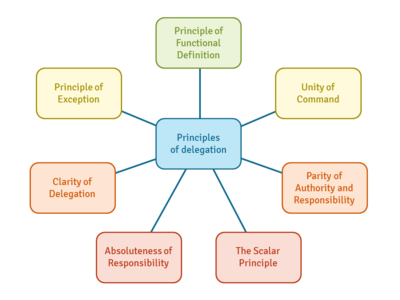Explain the Different Principles of Delegation
The responsibility means assigning the work to an individual. Different authors have used various terms to explain the process of delegation.

Effective Delegation Definition And Principles Of Effective Delegation
5 delegation mindset principles.

. Delegation takes place when a manager grants some of his powers to subordinates. The followings are some of the important principles of delegation of authority. Principle of Result Expected.
How is work allocation different from delegation. Delegation plays an important role in. Delegation occurs only when the person delegating the authority himself has that authority ie.
An organization functions as the authority flows from top level to bottom. 4 Establishes Management Hierarchy. For example it would not make efficient sense to have the CEO CEO A CEO short for Chief Executive Officer is the highest-ranking individual in a company or organization.
Technically responsibility is the obligation. Authority is the power to carryout an assignment and responsibility is the obligation to accomplish them. I Entrustment of responsibility or duty ii Granting of authority and iii Creation of obligation or accountability.
Authority should be Co-Extensive with Responsibility. The flow of authority is from top to bottom which is a way of achieving results. Table of Contents.
These groups describe delegation as the process for a nurse to direct another person to perform nursing tasks and activities. To delegate is to assign responsibility and authority to someone else in order to complete the task at hand but you retain the overall responsibility for its success. By delegating work to others the individual is transferring work to people whose skills better fit the tasks.
1 Delegation of Authority improves the quality and efficiency of management of the company. The superior must not delegate the authority fully. The managers assign certain responsibility to the subordinates for the completion of certain tasks on his behalf.
Delegation involves the transfer of responsibility for the performance of a task from one individual to another while retaining accountability for the outcome. The phrase Delegation by the expected results implies that. Only a part of authority is delegated to subordinates.
A manager must possess what he wants to delegate. Principle of Functional Definition. Discuss any four 4 principles of delegation and appropriate.
Delegation of authority is the ground on which the superior-subordinate relationship stands. An individual has to apply all his physical and mental ability to get the task completed. Principles of Delegation 7 Well-Recognised Principles of Delegation 1.
Delegation of authority is very important to any organization as it empowers employees or team members. Elements of Delegation of Authority. We all are familiar with the word authority.
Techniques of delegation using an example in a nursing managementleadership context. This in fact shows that through delegation the superior-subordinate relationship become meaningful. An organization is comprised of different functional departments each contributing.
The delegation of authority is what is done by the manager or any higher level employees and to the subordinates. The delegator is a registered nurse who distributes a portion of patient care to the delegatee. It is essential in sharing authority and duty among individuals.
A balance between authority and responsibility should. There are several key factors that you need to be aware of and be. Assignment of Duties in Terms of Expected Results.
Elements of Delegation Authority. Adherence to the Principles of Delegation Strict adherence to the principles of delegation like parity of authority and responsibility unity of command and absoluteness of accountability are most essential for effective delegation. Delegation involves at least two individuals.
The functions to be performed the methods of operations and the results expected must be clearly defined. The simple truth is that there is no point in delegating unless you have the right mindset. 2 Delegation of Authority facilitates in producing new and potential leaders.
The following principles that serve as guidelines for effective delegation of authority are given below. Of course authority is the power of a person to command his. The authority delegated must be adequate to ensure that these functions are well performed.
Discuss any four 4 principles of work allocation using appropriate examples in a nursing managementleadership context. The process of delegation involves three elements or aspects. A Authority should commensurate with responsibility- It is not correct to say that authority should be equal to responsibility.
The delegation of authority characteristics are an important part of the concept that can describe it fully to its capacity. The Importance of Delegation. ANAs Principles for Delegation Definitions 6 assessment and evaluation of the impact of interventions on care provided to the patient adapted from Fowler 2008 p.
The delegator and the delegatee. Here are some of them. 3 Motivates Employee and provide growth opportunity.
Essential Components of Delegation. Following are the guidelines that can be followed by the managers to practice an efficient delegation. There are three major elements of delegation of authority.
Delegation also involves some transfer of responsibility.

Principles Of Delegation Ceopedia Management Online

What Are The Principles Of Delegation Of Authority Definition And Principles Business Jargons

Things You Need To Know About Delegation Of Responsibilities In Clinical Research Clinical Research Clinic Nursing School Survival
No comments for "Explain the Different Principles of Delegation"
Post a Comment